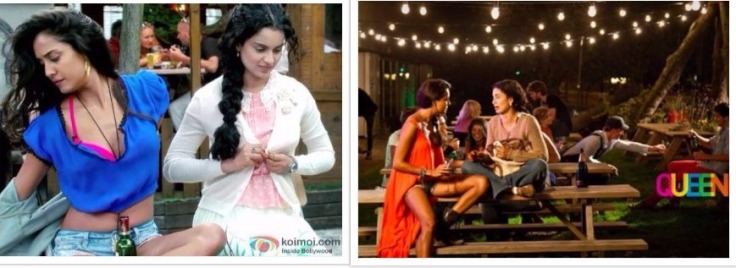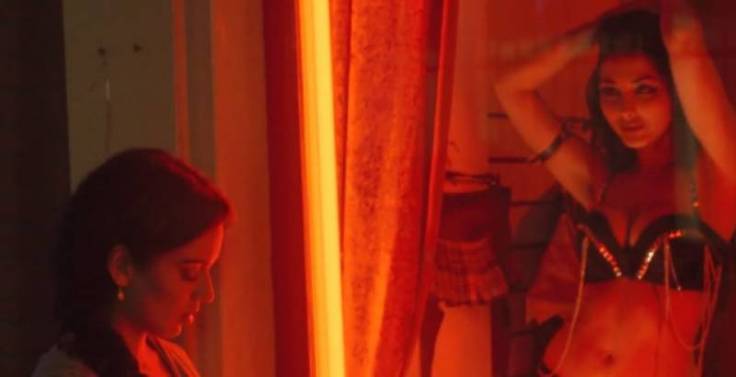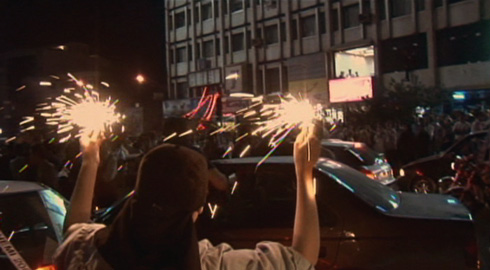Under the “Transnationalism and Gender” theme, I will discuss Vikas Bahl’s Queen (2014) and Jafar Panahi’s Offside (2006) to examine cinema as a powerful pop culture medium in fighting for women’s rights and gender equality.
Vikas Bahl has proudly produced “Queen” as a film about a female protagonist – Rani. In contrast to most of the previous Bollywood films, all male characters in “Queen” (Vijay – Rani’s fiance or Marcello – the Italian man) only act as “incidental hiccups” in Rani’s life. Indeed, “Queen” is a critical movie that reflects the post-2010 trend of “passive or missing male protagonist and an all-important female protagonist” (Gupta, 2015). Although Rani, Vijay and Roxette are three different women with very distinctive lifestyles, personalities and motivations, together they have challenged the gender dynamics in Bollywood in a way that “subverts the reductive and traditional delineation of its female characters” (Gupta, 2015).
Rani is a girl in her 20s, equipped with an English education and brought up conforming to the traditional values of Indian women. She needs her parents’ permission to go out and is usually accompanied by her brother. At first, Rani seems no different from a weak and submissive Indian girl (considering her relationship with Vijay), but as the film progresses, she surprises the audience with her inner strength. The honeymoon trip turns out to be a self-discovery voyage for Rani where she fights her own battle, refusing to be labeled as weak and “either act as agents of their fates or of social change” (Chute 2016)
Rani proves herself to be stronger than expected when dealing with the pickpocketer in Paris (source: Youtube)
The appearance of Vijay and Roxette in Rani’s journey also add to telling the story of women’s values. They both have a back-story: Vijay is a hotel maid working to provide for her son; Roxette prostitutes herself to make ends meet and support her family. Whatever they do, they are good people at heart. “Queen” is not about preserving a woman’s purity but about understanding a woman’s place in today’s world. Moreover, the film dis-attaches women from the so-called Indian cultural values by positively portraying Vijay and Roxette as very modern and liberal thinking women. “Queen” is praiseworthy in the way that it celebrates this empowerment and individuality of modern Indian women (Gupta, 2015).


Similarly, Offside’s narrative is mainly about a group of female football fans during Iran’s final qualifying match for the 2006 World Cup against Bahrain. Despite its setting, the film rarely reveals the actual game but consistently follows the central female characters (Danks, 2007).
Offside follows the story about a group of female fans masquerading as men to get into the football stadium (source: YouTube)
As a self-proclaimed social filmmaker, Jafar Panahi once said “I believe that it is the greatest insult to women that they have to deny their identity as women… to take part in society” (Maruf, 2006). Offside challenges the ill-defined regulation that excludes women from participating in football. Indeed, the female fans are depicted as much more knowledgeable and passionate about the sport compared to their male counterparts (especially Samandar – the young male soldier who dislikes of football). Panahi is such a master that he uses women’s expertise to undermine the notion that men are authorities whenever it comes to sports (Toffoletti, 2014).
For me, the scene where the girls together with a teenage boy eagerly lean forward to follow the commentary is extremely beautiful. It beams with hope about a future where women can enjoy the same rights as men. The film beautifully closes with the girls holding sparklers into the crowd, a great metaphor for their power and exuberance.


Despite the strict censorship in Iran back then, Offside managed to document a moment when Iranians did not have the rights and freedoms that the young generation now enjoy.
All in all, I am very much impressed by the way Offside and Queen challenge the undermined role of women in the patriarchal society. The films have managed to voice about freedom and individualism for women, leaving me with so much hope for a future with increased gender equality. That is why I put forth the statement that cinema is a powerful pop culture medium to raise awareness about social issues.
References:
Chute, D 2014, ‘Film Review: Queen’, Variety, 23 March, viewed 3 September, <http://variety.com/2014/film/global/film-review-queen-1201143643/>
Danks, A 2007, ‘The Rules of the Game: Jafar Panahi’s Offside’, Directors Suite: Jafar Panahi – Offside [4,000 word DVD booklet], Melbourne: Madman Entertainment.
Gupta, S 2015, ‘Kahaani, Gulaab Gang and Queen: Remaking the queens of Bollywood’, South Asian Popular Culture, vol.13(2), pp.107-123.
Maruf, M 2006, ‘Offside rules: An interview with Jafar Panahi’, OpenDemocracy, 7 June, viewed 3 September, <https://www.opendemocracy.net/arts-Film/offside_3620.jsp>
Toffoletti, K 2014, ‘Iranian women’s sports fandom: Gender, resistance, and identity in the football movie Offside’, Journal of Sport and Social Issues, vol.38(1), pp.75-92.
Feedback/Comment on Blog Entries
https://adayumansiu.wordpress.com/2017/09/06/66/comment-page-1/#comment-10
https://s3598528blog.wordpress.com/2017/09/06/transnationalism-gender/comment-page-1/#comment-7

Hey Duong!
I really enjoyed your discussion on how Queen and Offside both challenge the traditionally patriarchal social and cinematic structures in India and Iran. I also especially felt a sense of empowerment and pride watching Vikas Bahl’s representation of progressive female characters like Rani, and that celebrate instead of degrade characters like Roxette and Vijayalakshmi for their untraditional lifestyle choices.
Especially in countries like India where representations of capable multi-dimensional modern women are still developing in cinema, I agree it’s important that these films “have managed to voice about freedom and individualism for women, leaving me with so much hope for a future with increased gender equality”. How do you think films like Queen have affected/inspired Indian cinema and ordinary women in Indian society? How do you hope Indian cinema will continue to develop?
LikeLike
Hey Jess!
Thanks for such an encouraging comment! 🙂 I think films like Queen definitely play a critical goal in promoting the image of progressive women in India. It has depicted women in such a different way, much more positive than ever before in the history of Bollywood. For the first time female play a leading role rather than being subservient to the male characters.
Vikas Bahl’s Queen in 2014 actually inspired the production of several films focusing on women, such as Mardaani and NH 10. These films have encouraged and empowered Indian women to force their own identity within the traditional and patriarchal society of concurrent Indian society.
As far as I’m concerned, more Indian actresses are now willing to take the leading role in Bollywood films (although they are not paid as well as their male counterparts). In addition, as Indians have become increasingly conscious of women’s rights, films featuring female protagonists are likely to receive favorable reactions from the audience. I think that there’s so much hope for a future Indian cinema with new releases of films where women are in the lead.
Hope it answers your question! 🙂
LikeLike
Hi Duong, I really like how you explained about the two movies and the scenes you included to further clarify your thoughts. In the movie Queen, i think that indian women today are forging their own identity and it’s very clear through Rani’s journey of self-discovery. What are your thoughts on why there is such a rare female inclusion in Indian films? Do you think that the West was the one that influenced the Bollywood culture to portray a female protagonist?
LikeLike
Hi Carmen,
Thanks for your comment! 🙂
I remember reading somewhere that Queen has set a stage for a more women-centric movie in Bollywood. After Queen, Mardaani and NH 10 are also two acclaimed movies featuring female protagonists.
In my opinion, the rare female inclusion in Indian films can be attributed to the conventional values in India where men are perceived to be more powerful and superior to women. As a result of this social factor, the film industry of Bollywood is also traditionally male driven. Practically, every Bollywood film is ruled by a male character (be it father, husband, son or brother); female characters do not have any meaning without their male counterparts.
I think it might be true that the West influenced Bollywood to portray female protagonists in some way. However, I believe the rise of female characters in Bollywood is more likely a result of shifting Indian societal attitudes. Indians have become much more conscious of women’s rights and gender equality. There are more and more activists and feminists who challenge cultural stereotypes about women’s position in society.
LikeLike
Hi Duong,
First off i would i would like to say brilliantly done with the analysis of both films, first off i liked the way you structured your blog and just overall the flow of it. I liked the many references you have included in your blog as they are well sourced clear and concise. With Offside i think you did a brilliant job analysing not just the film but the broader demographics as well. I liked how you talked about the various scenes and gave a good in depth analysis of the many elements at work in the film for ex the picture of the girl holding fireworks. I liked your analysis of queen I thought it was brilliantly done. I liked how you talked about the strength of a woman’s character and the various double standards with the two genders.
Good job
LikeLike
Hey Darren!
Thanks for your kind words!
The reason I was so passionate writing about Queen and Offside is that the films really took me by surprise. As I was unfamiliar with either Bollywood or Iranian cinemas, I did not have much expectation for the movies. To my surprise, they are actually very good! They look at the issue of women’s rights in a way that celebrates the empowerment and individuality of women.
Definitely two of my favorite films since the beginning of the semester! 🙂
LikeLike